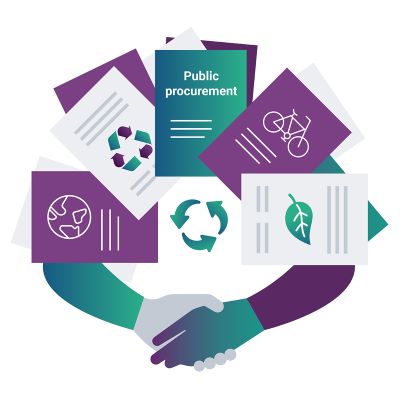A circular economy represents a key lever for public authorities to respond to environmental challenges (climate change, resource management that does not respect planetary limits, loss of biodiversity), while supporting the economic fabric of their region and creating local jobs.
Public-sector figures have to provide an impetus in this respect. In the European Union, it is estimated that the purchase of public services, works and supplies accounts for 14% of the GDP*! By moving towards a circular economy, public procurement have the power to support environmentally-friendly, forward-looking companies. In addition, public-sector figures can thus show citizens and economic players the way to a greener, more local economy!
To become circular, one of the main levers used by public authorities is to award contracts that incorporate various aspects of circularity. Opting for re-usable products, renovating a building with re-used materials, favouring the purchase of recycled or reconditioned goods, or leasing services rather than buying new goods are just some of the many ways through which public procurement can be made circular. Beyond public procurement, we can also pool and share resources, think about the maintenance of goods in order to extend their lifespan, re-sell unused equipment second-hand (when moving, for example) or optimise waste recycling.
I'd like to meet other players
You're convinced that it's a good idea to change your practices, particularly in terms of public purchasing, but you don't know which way to go?
Meetings with public authorities
Several times a year, the Public service of Wallonia organises meetings between the purchasing departments of various Walloon public authorities in order to present and discuss circular public purchasing projects. They provide a creative and welcoming environment, fostering the emergence of new ideas and strengthening the professional network. Discover the first peer-to-peer workshop on circular purchasing dedicated to Walloon cities here.
Furthermore, once a year, the Public service of Wallonia organises a meeting between purchasing departments and service providers from the circular economy. This larger-scale event is the ideal opportunity to broaden your horizons and discover any new tenders on the market. Relive the Rencontre 2024 event through a retrospective. The 2025 edition is currently being prepared, and information will be published shortly.
Would you like to be kept informed of upcoming meetings? Don't hesitate to contact us now at economiecirculaire@spw.wallonie.be. By contacting us, you'll receive all the latest news about these networking initiatives.
This programme of events is organised with the support of the Walloon Recovery Plan.
I want to find out more
Do you dream of setting up circular economy projects in your organisation, but you still need to work out how to proceed and find out about certain technical, economic and legal considerations before getting started?
 Here are some of the different tools available to support public authorities in their circular purchasing:
Here are some of the different tools available to support public authorities in their circular purchasing:
- The book by Cécile Van Oppen, Godard Croon and Dirk Bijl De Vroe entitled "Circular Procurement in 8 Steps" convincingly sets out the impact of circular purchases and describes the process in several stages. The book is aimed at all profile types and is accessible to novice readers.
- The Ellen MacArthur Foundation's interactive guide helps you to formulate questions that will encourage both you and your colleagues to rethink your approach. Each step of the process described in this guide is supported by examples and inspiring resources.
- The European Commission has also written its own guide entitled "Public Procurement for a Circular Economy". This guide succinctly presents various forms of circular contracts.
- Clauses and tools specific to each contract: this tool lists the various possible clauses for each type of contract (supplies, services or works).
- The thematic study on circular public purchasing commissioned by the Walloon Public Procurement Observatory. This study includes:
- an analysis of six exemplary and innovative cases of circular public procurement;
- a reflection on the transferability of the identified methods and good practices;
- highlighted focal points, pitfalls and recommendations.
- Introducing circularity into public real estate projects: This document drafted by the SPI development agency offers considerations and recommendations to support circularity within real estate projects that require a public procurement procedure.
If you are interested in sustainable public purchasing more generally, the Public Service of Wallonia has written an extensive guide on how, as a contracting authority, you can incorporate environmental, social and governance considerations into your public procurement contracts. This resource is aimed in particular at people with a profile involving a legal role.
The sustainable public purchasing helpdesk: for targeted questions
All circular purchasing projects can be supported on an individual basis via the sustainable public purchasing helpdesk. This service is intended to answer targeted questions when drafting your specifications.
To benefit from this service, send your specifications and questions to the following address: marchespublics.responsables@spw.wallonie.be.
You will receive a reply within 10 days. This service is available to agents of the Wallonia Public services Office (SPW), Public Administration Units (UAPs) and Walloon local authorities.
More information is available on the Sustainable public purchasing page of the Sustainable Development website.
Do you need help with a specific project involving the circular economy? The Circular Strategy Coordination Unit of Wallonia is available to help you implement more circular economy into your operations. If you have any questions, please contact us at: economie.circulaire@spw.wallonie.be

